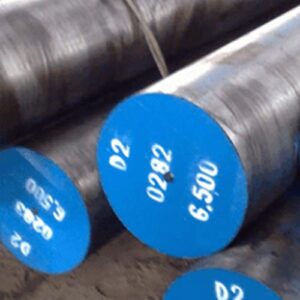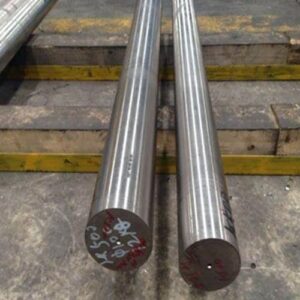Introduction

D2 tool steel, renowned for its exceptional hardness, wear resistance, and dimensional stability, stands as a cornerstone in manufacturing processes. This blog delves into the myriad advantages offered by D2 steel and its implications in various manufacturing applications.
What is D2 Tool Steel?
D2 tool steel, classified as a high-carbon, high-chromium alloy, epitomizes durability and longevity in manufacturing. With a chemical composition consisting of 1.40-1.60% carbon, 0.60% manganese, 11.00-13.00% chromium, and 1.10% vanadium, D2 steel showcases remarkable properties ideal for tooling and machining.
Advantages of D2 Tool Steel
- Exceptional Hardness: D2 steel’s high carbon content ensures remarkable hardness, making it suitable for applications requiring stringent wear resistance and cutting-edge retention. This exceptional hardness allows D2 steel to maintain its sharp edge even under high-stress conditions, ensuring consistent performance over prolonged periods of use. Moreover, the hardness of D2 steel also enhances its resistance to deformation, minimizing the risk of tool failure and increasing productivity in manufacturing operations.
- Superior Wear Resistance: The chromium content in D2 steel contributes to its exceptional wear resistance, enabling prolonged tool life even under abrasive conditions. This superior wear resistance not only extends the lifespan of D2 tooling but also reduces the frequency of tool replacement, resulting in cost savings for manufacturers. Additionally, D2 steel’s resistance to wear minimizes the need for frequent re-sharpening or re-profiling, optimizing production efficiency and throughput in various machining applications.
- Excellent Dimensional Stability: Manufacturers value D2 steel for its excellent dimensional stability, ensuring precision and consistency in machined components. The inherent stability of D2 steel minimizes dimensional variations during machining processes, leading to tighter tolerances and improved product quality. Furthermore, the dimensional stability of D2 steel translates into enhanced repeatability and reliability in manufacturing operations, reducing scrap rates and rework costs associated with dimensional inaccuracies.
- Good Machinability: Despite its high hardness, D2 steel exhibits good machinability when properly heat-treated, allowing for efficient shaping and fabrication processes. This favorable machinability of D2 steel facilitates ease of cutting, milling, and drilling operations, enabling manufacturers to achieve complex geometries with precision and accuracy. Moreover, the machinability of D2 tool steel contributes to shorter lead times and faster turnaround in production, enhancing overall productivity and competitiveness in the marketplace.
- Versatility: D2 steel finds applications across various industries, including automotive, aerospace, and tool manufacturing, owing to its versatility and adaptability to diverse manufacturing requirements. Whether it’s stamping dies in automotive production or punches and dies in aerospace manufacturing, D2 tool steel offers the versatility to meet the demanding needs of different applications. Its broad range of applications underscores the importance of D2 steel as a go-to material for critical components and tooling solutions across multiple industrial sectors.
D2 Tool Steel in Manufacturing Applications
D2 tool steel finds extensive usage in a multitude of manufacturing applications, including:
- Precision Cutting Tools: D2 steel’s exceptional hardness and wear resistance make it an ideal choice for manufacturing precision cutting tools such as drills, reamers, and milling cutters.
- Cold Work Tooling: Due to its high wear resistance and dimensional stability, D2 steel is extensively employed in cold work tooling applications, including blanking, punching, and forming dies.
- Injection Molding: D2 steel’s superior dimensional stability and machinability make it a preferred material for injection molding applications, ensuring precise and consistent mold cavities.
- Woodworking Tools: Woodworking tools such as knives, planer blades, and chisels benefit from D2 steel’s exceptional hardness and edge retention, enhancing performance and longevity.
D2 Tool Steel Properties: A Comparative Analysis

Below is a comparative analysis of D2 tool steel properties with other common tool steel grades:
| Property | D2 Tool Steel | A2 Tool Steel | M2 Tool Steel |
|---|---|---|---|
| Hardness (HRC) | 58-62 | 60-62 | 60-65 |
| Wear Resistance | Excellent | Good | Good |
| Toughness | Moderate | High | Moderate |
| Corrosion Resistance | Fair | Good | Fair |
| Dimensional Stability | Excellent | Good | Moderate |
Conclusion
In conclusion, D2 tool steel stands as a stalwart in the realm of manufacturing, offering a plethora of advantages ranging from exceptional hardness and wear resistance to superior dimensional stability. Its versatility and adaptability across various applications underscore its significance in modern manufacturing processes.
FAQ
Q: What are the primary applications of D2 tool steel?
A: D2 tool steel finds primary applications in precision cutting tools, cold work tooling, injection molding, and woodworking tools.
Q: How does D2 steel compare to other tool steel grades?
A: D2 steel exhibits comparable hardness and wear resistance to other tool steel grades like A2 and M2, with superior dimensional stability.
Q: Is D2 tool steel suitable for high-temperature applications?
A: D2 tool steel is primarily suited for applications at room temperature or lower temperatures due to its limited resistance to thermal softening.
Q: What are the recommended heat treatment processes for D2 steel?
A: Recommended heat treatment processes for D2 steel include annealing, hardening, tempering, and cryogenic treatment to achieve desired hardness and toughness properties.
Q: Can D2 tool steel be welded?
A: D2 tool steel has limited weldability and is not typically recommended for welding applications due to its high carbon and chromium content, which can lead to cracking and brittleness in the heat-affected zone.
This comprehensive overview underscores the significance of D2 tool steel in modern manufacturing, offering insights into its properties, applications, and comparative analysis with other tool steel grades.
